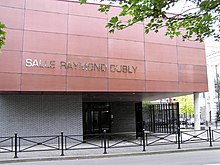Raymond Dubly
Raymond Dubly (born November 5, 1893 in Roubaix , Département Nord , † September 7, 1988 ) was a French football player .
The club career
Dubly, who discovered his interest in football on the occasion of a short stay in England at Uckfield FC , joined the Racing Club de Roubaix in 1911 , for which at least four of his older brothers also played, Jean even as an international (although only appointed once in 1908). Raymond was ambitious and took regular advice from a local trainer; That was the exception in the early days of football , but it obviously benefited the left winger: it improved basic speed (11.0 seconds over 100 m!) and ball technique and practiced dribbling with a tennis ball (today the “one-on-one situation " called).
His club was at the beginning of the century one of the strongest in the country ever had from 1902 to 1908 five times the national championship of the USFSA , the oldest and largest membership of before 1919 yet another competing football associations , recovered, and also played in the following years up to the First World War still very up with. A club title in the championship (which is only considered official from 1932) or a cup (greatest success: quarter-finalist in 1923) was denied Dubly before and after the war; but he became a national player at the age of 19 and stayed that way for more than twelve years.
When Raymond Dubly left the sport in 1931, he had remained loyal to "his" club for over 20 years, which was unusual for the time.
The national player
From February 1913 to May 1925 Raymond Dubly played a total of 31 times in the Équipe Tricolore , nine of them as team captain, scored "only" four goals, but prepared numerous more for Gabriel Hanot , Henri Bard , Paul Nicolas and Jules Dewaquez . Between 1923 and 1928 he was the record international player for France . Participation in the finals at the Olympic Games in 1920 and 1924 is one of his palmarès . The war prevented a larger number of international missions: between May 1914 and March 1919 France did not play a single international match; Dubly himself played seven games in 1913/14 and 24 in the period 1920-1925.
He also made a decisive contribution to the early first triumph of the Bleus (2: 1 against the " teacher England ", who played mostly with amateur players , exactly on Napoléon's one hundredth anniversary of his death); a headline the day after read "Napoléon Dubly has avenged Saint Helena". L'Auto , the predecessor of L'Équipe , wrote a bit more matter-of-factly about the stocky striker: “His advances sowed panic in the English defense; and he almost caught goalkeeper Ernest Coleman by surprise with a lift from 40 yards ”.
Life after football
Even after his active career, Dubly had not given up entirely on football: he played regularly in "alumni teams" until well after he was 50, and was also part of the coaching staff of the FFF football association for some time. Professionally, he worked for his parents' company near Laon until World War II , most recently as director. After its destruction he became a representative of a textile company; at 65 he retired. His hometown has a sports hall, the Salle Raymond Dubly , named after him.
| personal data | |
|---|---|
| SURNAME | Dubly, Raymond |
| BRIEF DESCRIPTION | French soccer player |
| DATE OF BIRTH | November 5, 1893 |
| PLACE OF BIRTH | Roubaix , France |
| DATE OF DEATH | September 7, 1988 |
